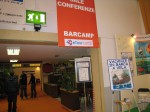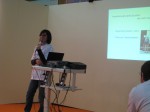Tag Archives: social media
Six Degrees from Disaster
Massacre at VA Tech – Malaysian Students Safe
read a headline I spotted via Google News this morning. Naturally, it came from Malaysia’s Straits Times newspaper.
It’s facile to say that the global is local and the local is global. But there’s more to this particular phenomenon. When we hear about horror anywhere in the world, the natural human instinct is to want to make sure our own loved ones are safe. But we also nurture a sneaky desire, hidden even from ourselves, to have some connection to the news, to somehow feel we are participants, not just audience, in a great world drama.
Of course, no one wants to be directly affected – to be killed or wounded, or have that happen to someone we know and love. But to be able to say that we were somehow part of the larger story – it’s only human to enjoy that.
This is the bread and butter of local newspapers, as I see constantly illustrated in the posters advertising Lecco’s local and regional papers. “So-and-so disaster elsewhere in the world: no Lecchese hurt”. But sometimes they are: “Lecchese drowns swimming in Rimini” appeared a year or so ago – this would hardly be local news (Rimini is on the Adriatic coast, nowhere near Lecco) except that a local man died.
As soon as something dramatic happens anywhere in the world, we would all like to be able to say whether or not we are connected with it or hurt by it. An ideal headline would read: [disaster] strikes [someplace else], hundreds dead – but no one you know.
Hence this modest (and ironic) proposal to some entrepreneur who’s got the technical skills: find a way to combine (mash up) Google News with all my social networks, so that I can immediately know whether the horrible (or good) events of the day hit me close to home. Call it “Six Degrees from Disaster,” because, as John Guare illustrated, we are all at most six “links” away from anyone in the world – in tragedy or in triumph.
Il Popolo della Rete – Italy’s Internet People
Four years ago, I wrote about the difficulties of making friends with Italians. I already had online (and offline) friends in Italy, but most of them were expats. I have Italian colleagues with whom I get along well at the office, but we don’t socialize outside (quite the opposite of my experience in American companies).
Turns out I was looking in the wrong places: I should have been seeking Italian friends in my other country beginning with I, the Internet.
I had one Internet-derived Italian friend, Alice Twain, but I didn’t start reading Italian blogs until last December, when I met Lele Dainese and, through him, various other Italian bloggers. Not surprisingly, the number of Italian blogs that I read jumped after barCamp Roma, and again after the Girl Geeks Dinner and rItaliaCamp.
I didn’t need more reading material, but these people are now friends, or on the way to becoming friends, so I’m genuinely interested in what they have to say. And I’m attending every offline get-together I can manage, to see the people I already know, and meet new ones.
Last night in Milan we had a Pandecena (see video) – so named because organized by Luca Conti, whose main blog is called Pandemia (cena = dinner). Italian netizens gather around Luca because he’s a highly influential and well-known Italian blogger, so a bunch of people who mostly had no previous acquaintance were happy to turn up at a dinner to meet him and each other. (NB: Upon meeting Luca, one also learns that he’s a thoroughly nice human being, so seeing him again is always a pleasure.)
To save me the hassle of commuting back to Lecco late at night after a long day (I had come in to the office early to avoid a train strike), Sara/Piperita had invited me to stay at her home in Milan. She issued this invitation although our acquaintance to date extended only to chatting briefly at the Girl Geeks dinner, and then some emails to organize a LikeMind event in Milan next Friday. This is extremely unusual behavior for an Italian: you just don’t up and invite strangers to stay at your house! (Well, I do, but I’m a weirdo and I’m not Italian.)
So I went over to Sara’s place after work to drop off my backpack, and spent an enjoyable couple of hours talking with her and her French husband. Aside: We could have spoken Italian or English equally comfortably – they have both spent a lot of time in England and are fluent in English as well as, of course, French (I don’t speak French, but can follow a lot of it).
I already knew that Italians who have travelled and lived outside Italy are generally more open to new people and experiences (this is also true of Americans and others who travel). It had not occurred to me (duh!) that there is naturally a strong correlation between Italians who have an active online life and Italians who travel. Like me, they have friends in other parts of the world, whom they keep up with via the Internet.
Which is not to say that every Italian online has travelled. But even those who have not exhibit a wide-eyed curiosity about the world very different from the average Italian attitude. Italy has one of the lowest rates of Internet use in the developed world (fewer than 50% of the population), because many Italians see no use in it except perhaps to buy cheap airline tickets. Most Italians are uninterested in making new friends after their school years, and, to these, the idea of making friends via the Internet is completely outlandish.
The Italians who are online, however, are open to – indeed, actively seek – new ideas and people. They’re the kind of people I enjoy knowing, and who enjoy knowing me.
Of course there’s the geek angle. People who show up to barCamps and so on are generally techies one way or another, or at least bloggers, so they find plenty of geek stuff to talk about. At last night’s dinner I heard far more about Python (a programming language) than I needed to know, and may have got myself into interpreting a speech (via video link) to be given by Alan Kay at Italy’s first PyCon, to be held in Firenze in June. (Modestamente parlando, they would have a hard time finding anyone better qualified than myself to do it. <grin>)
On the whole, it was a very enjoyable evening with a nice group of people, all of them Italian except me, some of whom are destined to become friends (not that I disliked anyone there – just talked to some more than others).
Two of my countries beginning with I, Italy and the Internet, are coming together – an unexpected but very happy development.
How do you make new friends in Italy?
A Whole New Me
I’m a cartoon! I’m not quite sure where I got the idea (although, admittedly, a number of bloggers are doing it). Since the unifying theme of this site is me, it makes sense to use myself as a logo. But I rarely like photos of myself, and a cartoon portrait seemed like more fun anyway.
The artist is Mike Segawa, whose work I noticed on a (Not Safe For Work) Buffy fan site years ago – he had done some wonderful pictures of Buffy characters and scenes, and I wanted to track him down to find out if he had any more. Eventually I found an email address and dropped him a note, but got no reply – for two years. I guess he had kept my email, because when he finally did get a site up (mikesegawa.com) he wrote to let me know about it.
By then I had come up with the idea of a cartoon portrait for my site, so I wrote back immediately – but again got no reply. I kept Mike’s site in my bookmarks and visited now and then to see what was new (lots of yummy artwork besides – yay! – more Buffy). A few months ago he mentioned on his home page that the email address had been wrong, and offered a new one. I wrote to that, and finally we were in touch.
It took a little longer to get the project done, but here we are at last. It’s more portrait than cartoon – the family double chin is clearly in evidence – but, hey, that’s the real me. And the lean-back air of ironic amusement, with the skeptical Gromit eyebrows, seems appropriate for my site. What do you think?
Communicating with Your Customers
Someone anonymous claiming to be an Apple employee launched a blog (now vanished) to discuss his/her thoughts on Apple’s communications with its customers. This was big news in the blogosphere, because Apple is notoriously secretive and uncommunicative.
The only Apple product I own is an iPod (I had a Mac SE 15 years ago, my first and last Macintosh), but I have read the few entries on this new blog, and the accompanying reader comments.
Many of the commenters decry the blogger’s anonymity, saying that it proves that the blog is a fake perpetrated by Apple itself as a publicity stunt. Some blogs have recently come to light claiming to be produced by individuals who “just happen” to love a company or its products so much that they would dedicate time to blogging about it, but these blogs turned out to be funded by the companies in question (e.g., Wal-Mart). Such subterfuge cannot long remain hidden in the teeming online world: when thousands of minds attack a puzzle such as “who’s really behind this blog?”, it gets solved very quickly.
The Apple blogger him/herself points out, reasonably enough, that to be identified by the company could cause her to lose her job (most of the commenters seem to assume the “Masked Blogger” is a man, while I, for no particular reason, think she’s a woman).
The Masked Blogger’s avowed purpose is to start a conversation about what Apple could be doing to communicate better with its customers. She’s asking the right questions, and some of the answers are useful. It therefore doesn’t matter whether the blog is genuine, because Apple is reading it. Whether they read it to see how their PR experiment works out, or to try to identify their rogue employee, the conversation about conversation is taking place – and Apple, volente o nolente*, is listening.
Whether they will learn anything is another question. It surprises me that this conversation is still needed. All the “new wisdom” floating around the blogosphere about how companies should communicate with their customers (the current vogue, of course, is that they should use blogs) follows principles that I invented for myself over ten years ago, starting in CompuServe forums (yes, I am a geek antique).
You want to communicate with your customers online? It’s not rocket science.
The basic principles are:
- Be honest. This doesn’t mean that you need to spill your guts and tell every company secret, but everything you do say must be absolutely true. And, when you know there’s a problem that affects customers, say so, especially if asked point-blank. Don’t imagine that you can pretend ignorance, or hide behind spin and subterfuge – you can’t.
- Be real. Not every problem is going to get fixed quickly and not every customer is going to be happy. If you explain what steps are being taken and how soon you (reasonably) expect them to take effect, customers are surprisingly forgiving. Most will love you just for showing that you’re listening and trying to help. Sometimes you can’t fix a problem; not everything customers say they want is even possible. When I worked for Adaptec/Roxio, I frequently used the line: “Fast, cheap, or perfect – pick two.” Most customers understand that businesses cannot supply everything for nothing. If you can give a reasonable explanation for why you can’t do what they’re demanding, or can’t do it as fast as they would like, they get it. And they appreciate being spoken to like capable adults. Weasel-speak only shows contempt for your listener; no one likes that.
- Be yourself. Perhaps because I started out “talking” to people personally in forums (and never wrote marketing copy for a living), it always came naturally to write in my own voice. I was surprised at how well people responded to this, telling me: “we, as customers, like the feeling that we are dealing with a real person, not a machine producing corporate ‘happytalk’.” NB: This did not mean that they wanted to hear about my vacations or what I ate for lunch or my views on politics, nor did it mean that I could tell someone he was an idiot even when I thought so – I represented the company and, when you do that, you ALWAYS have to be polite. And careful: sarcasm usually backfires online, and even mild irony gets over-interpreted.
- Be strong. It’s a hard job, representing a company online. You’re highly visible: when the shit hits the fan, you’re the first to get spattered. Because people are accustomed to being treated badly by every other company, their default assumption is that you, too, are out to screw them, that your niceness is just a ploy, it’s all a PR stunt, etc.NB: OF COURSE it’s a PR stunt – everything that you do in the name of your company where a customer can “see” you is marketing and PR (whether you – or your company – realize it). Every employee in any company who ever has contact with a customer has a chance to make or break the company’s reputation – maybe just with that one customer, maybe with many who will hear by word of mouth about that customer’s experience. What is that if not PR?
Be prepared for suspicion and abuse. Just keep smiling, and nice them to death. Trolls get bored quickly, and they are a small minority, no matter how loud. The silent majority will respect your patience, good manners, and tolerance. In fact, if you hold out long enough, they will start leaping to defend you!
- Believe. Being nice under duress does take a psychic toll, so you’d better be doing it for a company, product, or cause that you believe in. And it’s fine to defend your belief passionately: people respond to passion, even if they don’t necessarily agree with you on its target.
Okay, I’ve told you everything you need to know. Now get out there and talk to your customers!





















